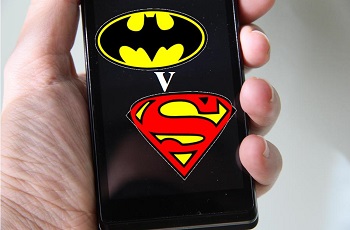Ahead of the much-anticipated film release, the Dark Knight joins the Last Son of Krypton in a new gaming app.
Fans of Batman and Superman don’t need to wait until the release of their crossover movie, now that a mobile game has been released that features both characters in one of the largest battles in the history of DC Comics.
Though the plot may be set on the big screen, when it comes to the game app, it’s the player who decides.
The mobile game “Batman v Superman: Who Will Win?” has now been released to help to drive the excitement over the film that will be released later this month. The film is set to hit theaters on March 25, so the release of the game app is a timely one in helping people to be able to wait for the big day and to try to predict what the outcome of the actual movie will be. It provides a good amount of play time to be able to try to work out who might come out on top at the end of the motion picture.
The game app is available to both iOS and Android mobile device users, as well as through browsers.
 The point to the game is to try to determine “Who Will Win?”, just as the name suggests. For people who don’t want to download the gaming app, this one’s also available through a regular web browser.
The point to the game is to try to determine “Who Will Win?”, just as the name suggests. For people who don’t want to download the gaming app, this one’s also available through a regular web browser.
For those who might be concerned about movie spoilers, that shouldn’t be a problem. The description of the game play is that it is direct and simple and that it plays out depending on the way the gamer heads and not necessarily in any direction that actually reflects the plot of the movie.
To play, the gamer needs only choose whether he or she would like to be Batman or Superman. Then, that character can make his way throughout the city while collecting items. There are also a number of potential upgrade abilities that help the character to improve performance, such as with the “head start” upgrade for running. Those can be added using points that have been accumulated throughout the game play.
The points from the mobile game are also poured into a mass pool that will help to determine the way the game will end.
Samsung and Apple may go head to head in the growing mobile market
In the race for dominance in the mobile commerce field, Samsung is beginning to catch up to Apple. Google, Samsung, and Apple have all established a foothold in the mobile payments field with their relatively new services. These services make it possible for consumers to pay for products using their mobile devices, both online and in physical stores. Mobile payments services are growing in popularity, especially in China, where both Samsung and Apple are currently vying for the favor of consumers in the competitive market.
Samsung Pay now has more than 5 million registered users
Samsung recently introduced its Samsung Pay service, which has already acquired a great deal of support from companies and consumers alike. According to Samsung, some 5 million people have already signed up for the service. Samsung Pay has processed more than $500 million transaction in the United States alone since launching in September of last year. The service is quickly closing in on Apple Pay, which has established a strong lead in the U.S.
Apple Pay still has a considerable lead over other services
 Apple Pay has an estimated 12 million monthly users throughout the world, experiencing aggressive growth since its launch in October of 2014. The service recently launched in China following some resistance from Chinese banks and is expected to find some modest success. Many consumers have come to show support for Apple Pay because of its security features, which are also present in Samsung Pay and Google’s Google Pay service.
Apple Pay has an estimated 12 million monthly users throughout the world, experiencing aggressive growth since its launch in October of 2014. The service recently launched in China following some resistance from Chinese banks and is expected to find some modest success. Many consumers have come to show support for Apple Pay because of its security features, which are also present in Samsung Pay and Google’s Google Pay service.
Innovative technology may help Samsung compete with others
While Apple currently holds the lead in the mobile payments space, Samsung is likely to catch up quickly due to the acquisitions it made last year. Samsung acquired LoopPay in 2015, whose technology mimics the magnetic stripes found on most conventional payment cards. This has made Samsung Pay more accessible to a wide range of consumers. Backed by this technology, Samsung may be able to establish a very powerful position in the mobile commerce market, which is expected to reach $142 billion by 2019, according to Forrester Research.
 The point to the game is to try to determine “Who Will Win?”, just as the name suggests. For people who don’t want to download the gaming app, this one’s also available through a regular web browser.
The point to the game is to try to determine “Who Will Win?”, just as the name suggests. For people who don’t want to download the gaming app, this one’s also available through a regular web browser.
 Apple Pay has an estimated 12 million monthly users throughout the world, experiencing aggressive growth since its launch in October of 2014. The service recently launched in China following some resistance from Chinese banks and is expected to find some modest success. Many consumers have come to show support for
Apple Pay has an estimated 12 million monthly users throughout the world, experiencing aggressive growth since its launch in October of 2014. The service recently launched in China following some resistance from Chinese banks and is expected to find some modest success. Many consumers have come to show support for 